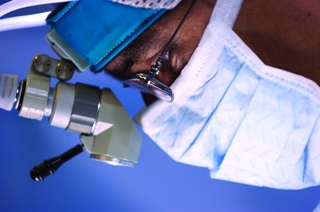Surgery for primary hyperparathyroidism
UC Davis Comprehensive Cancer Center offers comprehensive, multidisciplinary care for patients with primary hyperparathyroidism, a condition in which a tumor of the parathyroid glands increases your blood calcium.
We aim to provide minimally invasive surgery, prevention of disease recurrence and optimization of quality of life.
Your team of cancer specialists will include experts in endocrine surgery and surgical oncology, who closely collaborate with other health care professionals, including our surgical oncology clinical nurses, medical oncologists, radiologists and endocrinologists.
 Primary hyperparathyroidism is caused by a tumor of your parathyroid gland(s). Parathyroid tumors may be either benign or malignant. However, malignant tumors are very rare. Your doctor will begin with evaluation of your blood calcium and parathyroid hormone levels to determine if a tumor of the parathyroid gland(s) is likely the cause of your symptoms. Imaging studies such as an ultrasound, CT scan, Sestamibi scan or MRI scan are often necessary to help our surgeons perform a minimally invasive surgery.
Primary hyperparathyroidism is caused by a tumor of your parathyroid gland(s). Parathyroid tumors may be either benign or malignant. However, malignant tumors are very rare. Your doctor will begin with evaluation of your blood calcium and parathyroid hormone levels to determine if a tumor of the parathyroid gland(s) is likely the cause of your symptoms. Imaging studies such as an ultrasound, CT scan, Sestamibi scan or MRI scan are often necessary to help our surgeons perform a minimally invasive surgery.
Specific surgical techniques for parathyroid tumors, most of which are benign, can include:
- Minimally invasive parathyroidectomy: The phrase "minimally invasive parathyroidectomy" is used to encompass a range of different procedures that strive to minimize the length of the surgical incision, thus facilitating a quicker recovery and better cosmesis (physical appearance). For decades surgeons made an incision to look at all four parathyroid glands. Today we use imaging studies (like ultrasound) to focus the operation and remove just the enlarged, problematic parathyroid gland. This focused, image-directed parathyroidectomy is frequently referred to as a minimally invasive parathyroidectomy. Typically, the incision is about one inch long.
- Four-gland parathyroid exploration: A type of surgery in which all the parathyroid glands are visually evaluated and the abnormal appearing one(s) removed.
- Subtotal parathyroidectomy: For patients in whom all four parathyroid glands are enlarged, surgeons must remove three and one-half of the glands to return blood calcium levels to normal.
- Cryopreservation of parathyroid tissue: Patients in whom all four parathyroid glands are enlarged or patients who require a second operation for hyperparathyroidism are at risk of having too little parathyroid tissue. This causes symptoms of low calcium. To protect against this, our surgeons can “freeze” a portion of your parathyroid glands for later implantation, if necessary.
- Intra-operative parathyroid hormone monitoring: People with overactive parathyroid glands produce parathyroid hormone (PTH) in large amounts. This can be detected in the blood. Because PTH does not last long in your blood, your surgeon can check the PTH levels during your operation to make sure no abnormal parathyroid glands are still present.
Candell L, Campbell MJ, Shen WT, Gosnell JE, Clark OH, Duh QY. Ultrasound Guided Methylene Blue Dye Injection for Parathyroid Localization in the Reoperative Neck. World J Surg. 2014 Jan;38(1):88-91.
MORE »
Campbell MJ, Duh QY. Recurrent and Persistent Hyperparathyroidism. Current Surgical Therapy, 11th Ed. Elsevier Saunders. Philadelphia. 2013.
Campbell MJ, Duh QY. The value of multidisciplinary care in endocrine surgery. World J Endo Surg. 2013 May; 5(2): 5-7.
Oncologists Specializing in Endocrine Cancers
Surgical Oncology and Endocrine Surgery
 Michael Campbell, M.D.
Michael Campbell, M.D.
Professor and Section Chief, Endocrine Surgery
Division of Surgical Oncology
 Claire Graves, M.D.
Claire Graves, M.D.
Assistant Professor of Surgery
Otolaryngology / Head and Neck Surgery
 Marianne Abouyared, M.D.
Marianne Abouyared, M.D.
Assistant Professor of Otolaryngology
Head and Neck Oncology and Microvascular Surgery
 Arnaud F. Bewley, M.D.
Arnaud F. Bewley, M.D.
Assistant Professor of Otolaryngology
Head and Neck Oncology and Microvascular Surgery
 Andrew Birkeland, M.D.
Andrew Birkeland, M.D.
Assistant Professor of Otolaryngology
Head and Neck Oncology and Microvascular Surgery
 Scott Fuller, M.D., M.Sc.
Scott Fuller, M.D., M.Sc.
Assistant Professor of Otolaryngology
Neurological Surgery
 Orwa Aboud, M.D., Ph.D.
Orwa Aboud, M.D., Ph.D.
Assistant Professor of Neurological Surgery
 Orin Bloch, M.D., FAANS
Orin Bloch, M.D., FAANS
Associate Professor of Neurological Surgery
 Kiarash Shahlaie, M.D., Ph.D., FAANS
Kiarash Shahlaie, M.D., Ph.D., FAANS
Associate Professor of Neurological Surgery
Hematology and Oncology
 Jonathan Riess, M.D., M.S.
Jonathan Riess, M.D., M.S.
Associate Professor of Internal Medicine, Hematology and Oncology
Dietitians
 Danielle Baham, M.S., R.D.
Danielle Baham, M.S., R.D.
Genetic Counselors
Social Work
 Sarah Conning, L.C.S.W., O.S.W.-C.
Sarah Conning, L.C.S.W., O.S.W.-C.





 Nicole Mans, M.S., L.C.G.C.
Nicole Mans, M.S., L.C.G.C. Jeanna Welborn, M.D.
Jeanna Welborn, M.D.